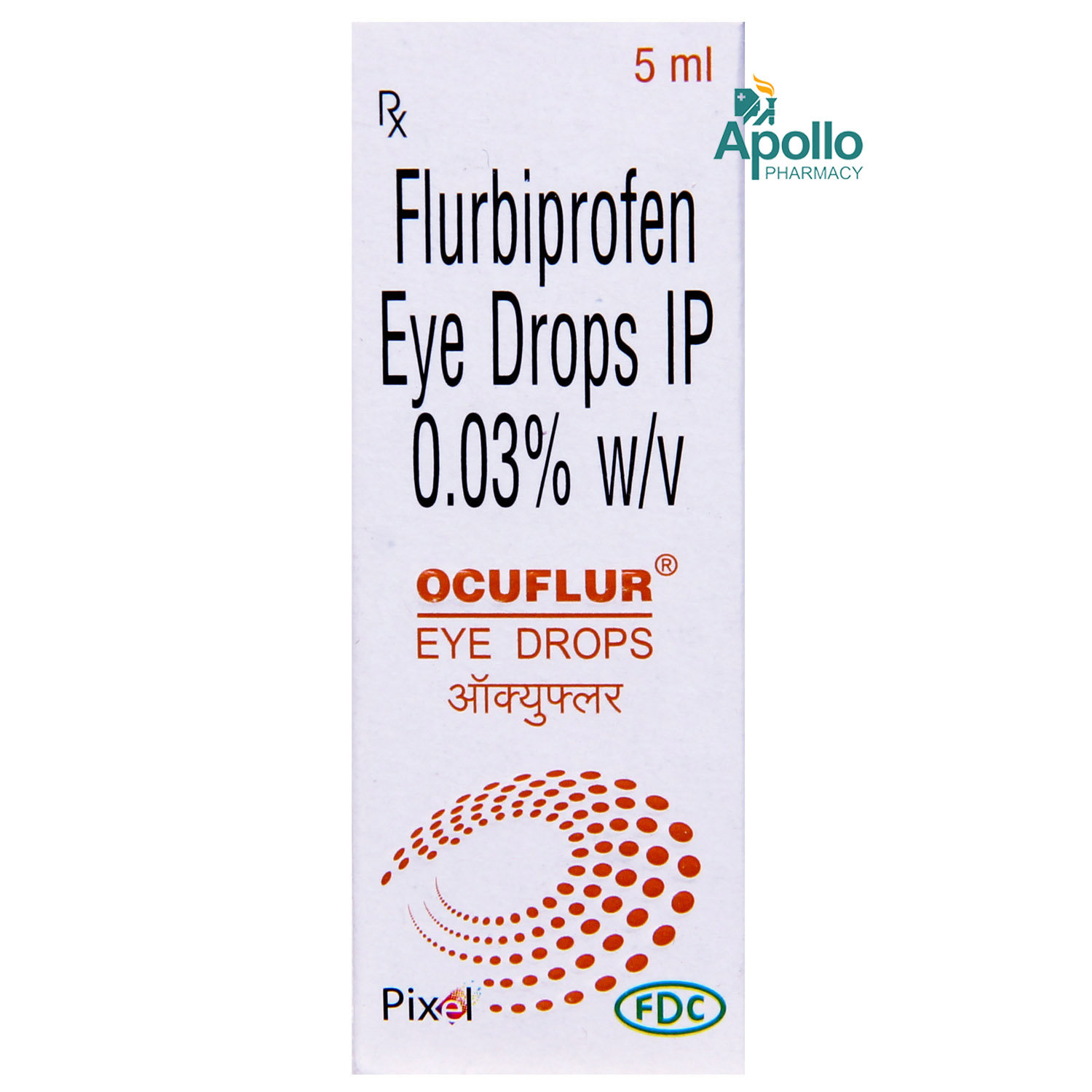FLUBIFEN EYE DROPS 10ML
MRP ₹56.5
(Inclusive of all Taxes)
₹8.5 Cashback (15%)
Provide Delivery Location
Online payment accepted
 Prescription drug
Prescription drugWhats That
Composition :
Manufacturer/Marketer :
Consume Type :
Expires on or after :
Return Policy :
About FLUBIFEN EYE DROPS
FLUBIFEN EYE DROPS belongs to the group of non-steroidal anti-inflammatory drugs (NSAIDs) used to control eye inflammation before and after eye surgery (such as cataract removal) and laser surgery. It also prevents intraoperative miosis (decreased pupil size) during surgery.
FLUBIFEN EYE DROPS is composed of Flurbiprofen, an ophthalmic anti-inflammatory agent. It works by preventing the pupil of the eye from narrowing, thus making it easier to examine the eye, remove the cataract and replace a new lens by the doctor. It is also used to relieve eye pain and inflammation after surgery.
FLUBIFEN EYE DROPS is for ophthalmic (for the eye) use only. Common side effects of FLUBIFEN EYE DROPS include eye redness, irritation, burning or a stinging sensation at the application site, and temporary blurred vision. These side effects may not occur in every patient using this medication and differ individually. If the side effects persist longer or worsen, please seek a doctor's advice.
Tell your doctor if you are allergic to FLUBIFEN EYE DROPS or other medications. Avoid contact of the tip of the dispensing container with the eye, eyelids, fingers, and other surfaces to prevent contamination. If you are pregnant and breastfeeding, inform your doctor before using FLUBIFEN EYE DROPS. This medicine may cause temporary blurred vision; hence drive only when you are alert and have clear vision. FLUBIFEN EYE DROPS should be used in children only if advised by a doctor.
Uses of FLUBIFEN EYE DROPS
Directions for Use
Key Benefits
FLUBIFEN EYE DROPS contains Flurbiprofen which prevents the pupil of the eye from narrowing, thus making it easier for the eye examination to remove the cataract and replace a new lens by the doctor. It is a non-steroidal anti-inflammatory drug that inhibits prostaglandins and maintains intraoperative pupil dilation (widening). It further relieves pain and inflammation of the eye after surgery.
Storage
Drug Warnings
If you have allergic reactions to medicines/NSAIDs (sneezing, runny or stuffy nose, or wheezing), asthma, viral eye infections, and bleeding and blood clotting problems, inform your doctor before starting FLUBIFEN EYE DROPS. It is advised to check with your doctor before using FLUBIFEN EYE DROPS if you are pregnant or breastfeeding. Avoid driving or operating machines until you have a clear vision since the administration of FLUBIFEN EYE DROPS may cause temporary blurred vision for a while.
Drug-Drug Interactions
Drug-Drug Interactions
Login/Sign Up
Taking Ketorolac with Flubifen Eye Drops 10ml can increase the risk of side effects in the gastrointestinal tract such as inflammation, bleeding, ulceration.
How to manage the interaction:
Taking Flubifen Eye Drops 10ml with Ketorolac is not recommended, but it can be taken if your doctor has advised it. However, if you experience dizziness, lightheadedness red or black, tarry stools, coughing up or vomiting fresh or dried blood that looks like coffee grounds, severe headache and weakness contact your doctor immediately. Do not discontinue any medications without first consulting your doctor.
Taking Ketorolac with Flubifen Eye Drops 10ml can increase the risk of side effects in the gastrointestinal tract such as inflammation, bleeding, ulceration.
How to manage the interaction:
Taking Flubifen Eye Drops 10ml with Ketorolac tromethamine is not recommended, but it can be taken if your doctor has advised it. However, if you experience dizziness, lightheadedness red or black, tarry stools, coughing up or vomiting fresh or dried blood that looks like coffee grounds, severe headache and weakness contact your doctor immediately. Do not discontinue any medications without first consulting your doctor.
Using desirudin together with Flubifen Eye Drops 10ml may increase the risk of bleeding.
How to manage the interaction:
Although there is a interaction between Flubifen Eye Drops 10ml with desirudin, but can be taken together if prescribed by a doctor. However, if you experience dizziness, lightheadedness, red or black, tarry stools, coughing up or vomiting, severe headache and weakness contact your doctor immediately. Do not discontinue any medications without consulting a doctor.
Taking Flubifen Eye Drops 10ml with Enoxaparin can increase the risk of bleeding and hemorrhage.
How to manage the interaction:
Although there is a possible interaction between Flubifen Eye Drops 10ml and Enoxaparin, you can take these medicines together if prescribed by your doctor. If you notice any of these signs, bleeding, bruising, swelling, headache, feeling lightheaded, weakness, or seeing blood in your urine or stools, contact a doctor immediately. Do not stop using any medications without a doctor's advice.
Taking Flubifen Eye Drops 10ml with Etodolac can increase the risk of side effects (inflammation, bleeding, ulceration, and rarely perforation).
How to manage the interaction:
Taking Etodolac with Flubifen Eye Drops 10ml together can result in an interaction, but it can be taken if a doctor has advised it. However, if you experience unusual bleeding or bruising, dizziness, lightheadedness, red or black, tarry stools, coughing up or vomiting fresh or dried blood that looks like coffee grounds, severe headache, and weakness, consult the doctor. Do not stop using any medications without a doctor's advice.
Co-administration use of Diclofenac with Flubiprofen may increase the risk of stomach bleeding and ulcers.
How to manage the interaction:
There is a possibility of interaction between Diclofenac and Flubiprofen but they can be taken together if your doctor has prescribed them. Consult your doctor immediately if you experience any symptoms like Nausea, red or black, tarry stools, coughing up or vomiting fresh or dried blood that looks like coffee grounds, burning in stomach, acidity, severe headache and weakness. Do not stop using any medications without first talking to your doctor.
Using Flubifen Eye Drops 10ml together with dicoumarol can increase the risk of bleeding.
How to manage the interaction:
Although there is a possible interaction between Flubifen Eye Drops 10ml and Dicoumarol, you can take these medicines together if prescribed by your doctor. If you notice any of these symptoms - like bruises, pain, swelling, headaches, dizziness, weakness, bleeding, vaginal bleeding, nosebleeds, bleeding gums, red or brown urine, or red or black stools - make sure to contact your doctor right away. They can help figure out what's going on and provide the necessary treatment. Do not stop using any medications without first talking to your doctor.
Taking Flubifen Eye Drops 10ml with Vorapaxar can increase the risk of bleeding.
How to manage the interaction:
Taking Flubifen Eye Drops 10ml with Vorapaxar together can possibly result in an interaction, but it can be taken if your doctor has advised it. If you notice any of these signs, it's important to contact your doctor right away: bleeding, pain, swelling, headache, dizziness, weakness, vaginal bleeding, nosebleeds, bleeding gums, bruising, red or brown urine, red or black stools, severe and dangerous bleeding, complications, bleeding, bruising, feeling lightheaded, black or tarry stools, severe headache, bleeding or vomiting. Do not stop using any medications without a doctor's advice.
Taking Flubifen Eye Drops 10ml with Dabigatran etexilate can increase the risk of bleeding and hemorrhage.
How to manage the interaction:
Although taking Flubifen Eye Drops 10ml and Dabigatran etexilate together can evidently cause an interaction, it can be taken if your doctor has suggested it. If you experience bleeding, feeling dizzy or lightheaded, dark or sticky stools, throwing up blood, severe headache, or feeling weak contact your doctor immediately. Do not stop using any medications without first talking to your doctor.
Using dalteparin together with Flubifen Eye Drops 10ml can increase the risk of bleeding complications.
How to manage the interaction:
Although taking Dalteparin and Flubifen Eye Drops 10ml acid together can cause an interaction, it can be taken if your doctor has suggested it. However, if you experience unusual bleeding or bruising, swelling, vomiting, blood in your urine or stools, headache, dizziness, or weakness call a doctor right away. Do not discontinue any medications without consulting a doctor.
Drug-Food Interactions
Drug-Food Interactions
Login/Sign Up
Diet & Lifestyle Advise
- Manage stress, eat healthily, drink plenty of water, exercise regularly, and get plenty of sleep.
- Eat food rich in antioxidants such as berries, spinach, kidney beans, dark chocolate, etc.
- Know your allergy triggers, such as pollen, dust and other factors.
- Do not rub your eyes even though some ophthalmic drugs make your eye itchy.
- If you wear contact lenses: Clean and replace contact lenses more often. Never share contact lenses. Always wash your hands before inserting and removing the contact lens.
- Avoid staring at digital screens for longer durations. Rest your eyes every 20 minutes.
- Avoid or limit the intake of alcohol and caffeine.
Side Effects of FLUBIFEN EYE DROPS
- Redness of the eye
- Irritation
- Stinging/burning sensation
- Temporary blurred vision
Habit Forming
Therapeutic Class
All Substitutes & Brand Comparisons
RX
OCUFLUR EYE&EAR DROPS 5ML
FDC Ltd
₹76.5
(₹13.78/ 1ml)
170% COSTLIER
Author Details
We provide you with authentic, trustworthy and relevant information
Drug-Diseases Interactions
Drug-Diseases Interactions
Login/Sign Up
FAQs
Drug-Drug Interactions Checker List
- CLOPIDOGREL
- WARFARIN
- ENOXAPARIN
- PREDNISONE
Disease/Condition Glossary
Pupil constriction: Narrowing or constriction of the pupil of the eye during any eye surgery can make every step of the surgical procedure difficult. It may also lead to increased injury risk and reduce visualization during cataract removal and lens implantation. Non-steroidal anti-inflammatory drugs (NSAIDs) inhibit prostaglandins and maintain intraoperative pupil dilation, thus making it easier to perform eye surgery.

Have a query?
Alcohol
Safe if prescribed
There is limited information on how alcohol consumption affects FLUBIFEN EYE DROPS. Please consult your doctor before using FLUBIFEN EYE DROPS.
Pregnancy
Consult your doctor
If you plan to conceive or are already pregnant, inform your doctor before using FLUBIFEN EYE DROPS. Your doctor may prescribe this medicine if the benefits outweigh the risks.
Breast Feeding
Consult your doctor
If you are breastfeeding, please consult your doctor before using FLUBIFEN EYE DROPS.
Driving
Safe if prescribed
FLUBIFEN EYE DROPS may cause side effects like blurry vision, affecting your driving ability. Do not drive or operate machinery in such cases. Drive only when you are alert and have a clear vision
Liver
Consult your doctor
Let your doctor know if you have any history of liver diseases before instilling FLUBIFEN EYE DROPS.
Kidney
Consult your doctor
Let your doctor know if you have any history of kidney diseases before instilling FLUBIFEN EYE DROPS.
Children
Safe if prescribed
FLUBIFEN EYE DROPS can be used in children only when advised by a doctor.








